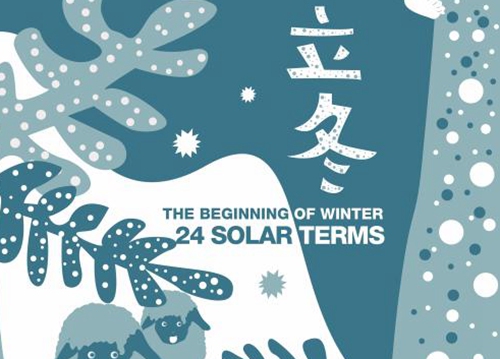Things You May Not Know about Start of Winter
The traditional Chinese lunar calendar divides the year into 24 solar terms. Start of Winter, (Chinese: 立冬), the 19th solar term of the year, begins this year on Nov 7 and ends on Nov 21.
In ancient times, the Chinese people took the Start of Winter to be the beginning of the winter. However, in fact, the Start of Winter is not the beginning of winter in terms of meteorology. The climate every year is different, so the beginning of winter could be quite different. And with the vast territory of China, winter of every area doesn’t begin at the same time.Here are eight things you should know about Start of Winter.

Welcoming the winter in ancient times
The four beginnings of the seasons were important festivals in ancient times. Before the Start of Winter, the ancient emperor would take a shower and have no more meat. On that day, the emperor would lead his officials to the suburbs and perform the ceremony of "Welcoming the winter."
1.Eating dumplings
A legend has it that at the end of the Eastern Han Dynasty (AD25-220), "Medical Saint" Zhang Zhongjing saved many people in Henan province from a typhoid epidemic and their ears' from being frostbitten around Start of Winter. He cooked mutton, hot peppers and herbs to dispel the cold and increase body heat. He wrapped these ingredients into a dough skin and made them into an ear shape. Since then, people have learned to make the food which became known as "dumpling". Today there is still a saying that goes "Eat dumplings on Start of Winter Day, or your ears will be frostbitten".
2.Yifan Festival of Mulam Ethnic Minority
Yifan Festival is one of the most important festivals of the Mulam ethnic minority in Guangxi Zhuang autonomous region. It is held around the Start of Winter every three to five years and lasts one to three days. The festival includes inviting the god, offering sacrifices, asking the god to enjoy the sacrifice, singing praise of the god, drinking wine with the blood of chicken, and sending the god off.
3.Eating pumpkins
In Tianjin, on the first day of Start of Winter, people eat dumplings stuffed with Chinese pumpkins (wogua). It is a common vegetable in North China. Generally, the pumpkins are bought in the summer and stored until the Start of Winter when they are taken out.
4."Nourishing the winter"
On the first day of Start of Winter, there is a custom, "nourishing the winter", in Southeast China in places such as Fujian, Guangdong and Taiwan provinces. To prepare for the oncoming cold winter, people there like to eat high-calorie food such as chicken, duck, beef, mutton, and fish, which are usually stewed with the four Chinese medicines: angelica, ligusticum wallichii, Chinese herbaceous peony and rehmannia glutinosa libosch, to enhance the effectiveness of the nourishment.
5.Offering sacrifices to ancestors
The Start of Winter, when the autumn crops have been placed in storage, was the time of the festival for the people of the Manchu Eight Banners and Han Eight Banners in Benxi of Liaoning province. Incense was burned and sacrifices offered to ancestors. The Eight Banners (baqi) were administrative/military divisions during the Qing Dynasty (1644-1911).




